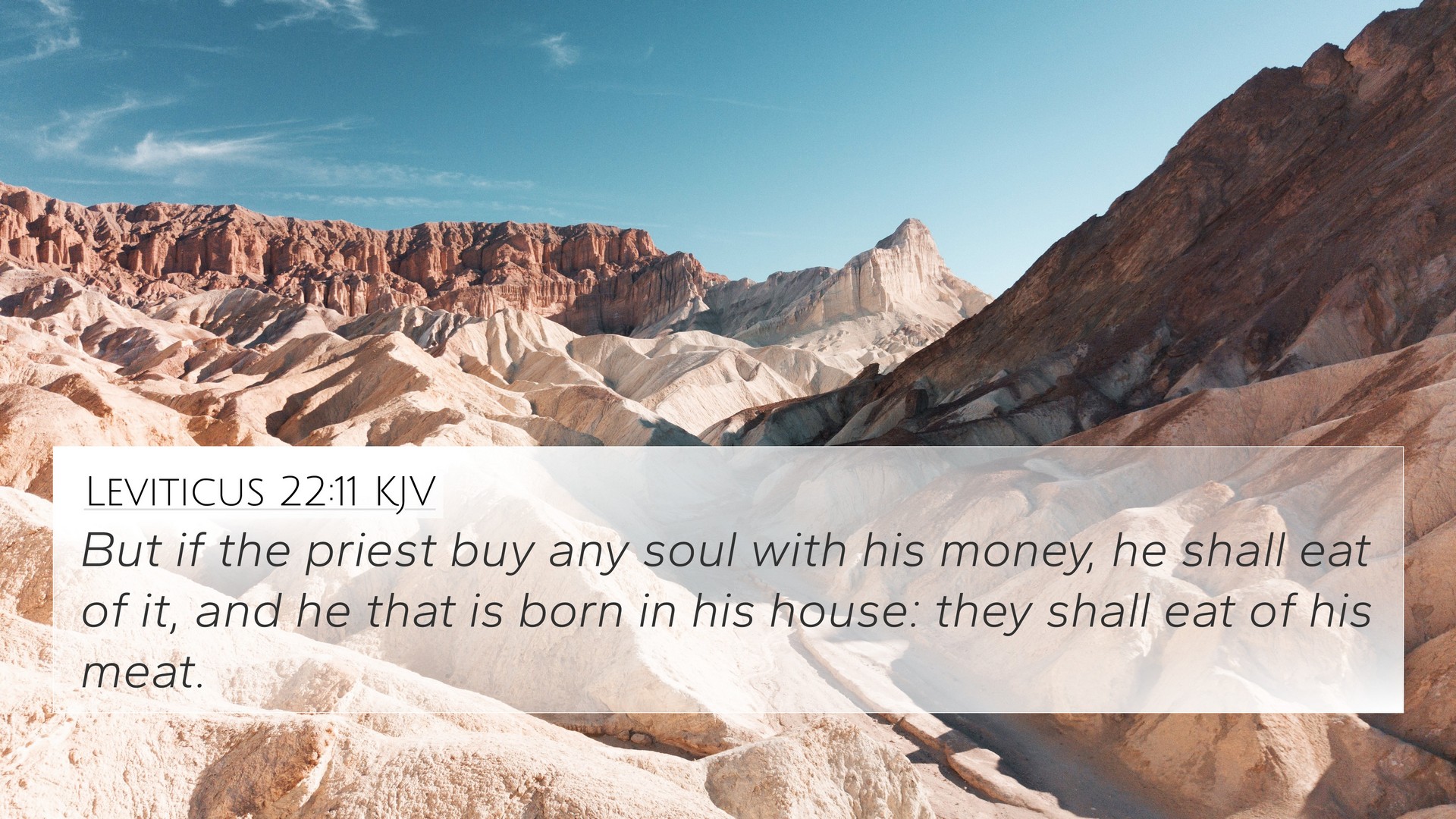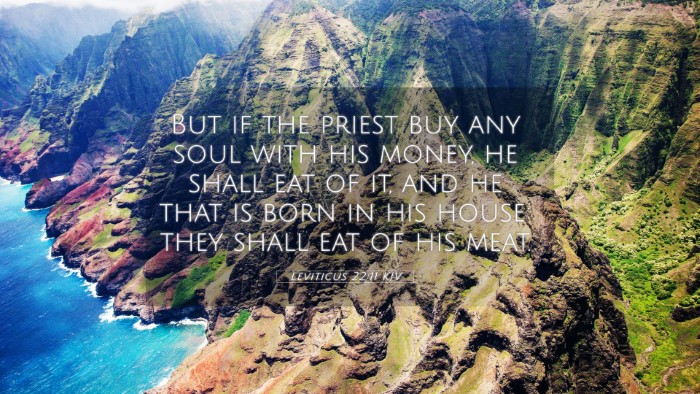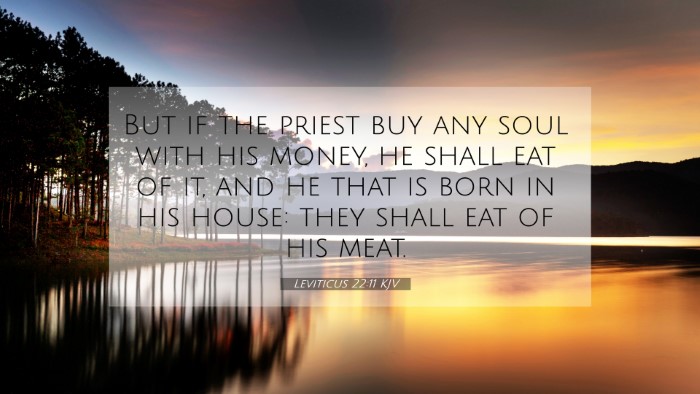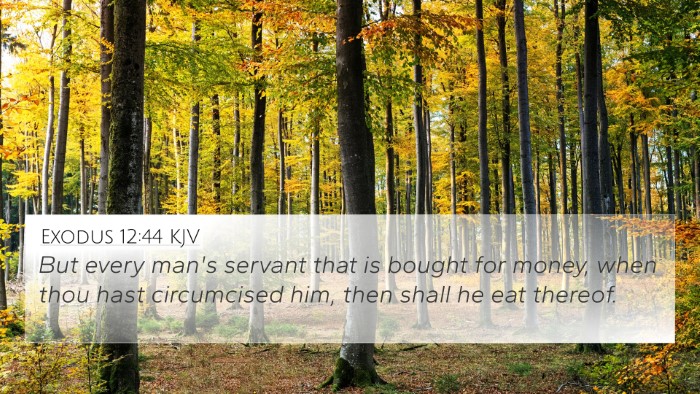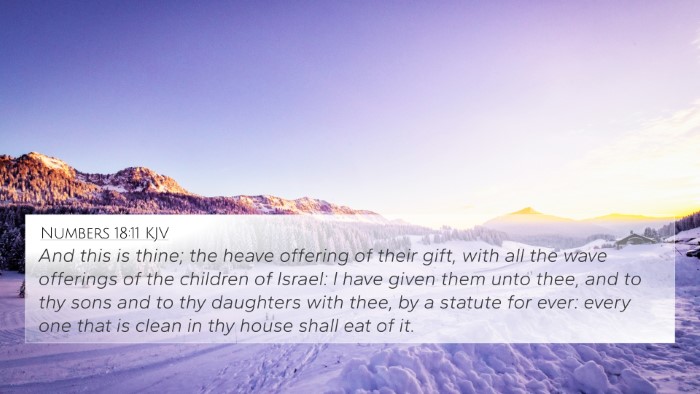Understanding Leviticus 22:11
Leviticus 22:11 states, “But if a priest buys a slave as his property for money, the slave may eat of it, and those who are born in his house may eat of his food.” This verse is part of the Levitical laws that govern the behavior and responsibilities of priests in ancient Israel.
Meaning of Leviticus 22:11
The verse highlights the distinction between the roles of priests and other members of society, particularly regarding ceremonial purity and their interactions with the community.
Key Insights from Public Domain Commentaries
-
Matthew Henry's Commentary:
Henry emphasizes the importance of the law for priests, showing how it provided guidelines for their conduct and relationships. The ability for priests to feed their slaves reflects the hierarchical nature of Israelite society and underscores the priestly family's responsibilities.
-
Albert Barnes' Notes:
Barnes notes that this instruction clarifies the priest's rights regarding household slaves. He suggests that this allowance demonstrates the care that priests were to show towards those in their household, ensuring they were sustained and provided for, which also allows for communal inclusion in divine provisions.
-
Adam Clarke's Commentary:
Clarke discusses the implications of the priest's ability to include his household in religious activities. He suggests this portrays a broader principle of community and family within the context of worship and service to God.
Cross-Referencing the Scriptures
This verse serves as an important link in inter-Biblical dialogue, connecting various themes and laws throughout the Bible. Here are some relevant Bible verse cross-references:
- Exodus 12:44: “But every slave that is bought for money may eat of it after you have circumcised him.” - This reinforces the ownership and care a master has towards his servant.
- Leviticus 25:55: “For the children of Israel are servants to me: they are my servants whom I brought out of the land of Egypt: I am the LORD your God.” - Establishes the relationship between God and His people as one where God cares for them as a master.
- Deuteronomy 15:12: “If your brother, a Hebrew man, or a Hebrew woman, is sold to you, he shall serve you six years; and in the seventh year, you shall let him go free from you.” - This highlights the treatment of servants and reinforces the importance of humane and fair treatment.
- 1 Peter 2:16: “Live as people who are free, not using your freedom as a cover-up for evil, but living as servants of God.” - Reflects the transformation of servitude into spiritual service.
- Matthew 10:24: “A disciple is not above his teacher, nor a servant above his master.” - Emphasizes the dynamics of servitude in respect to authority.
- Luke 17:10: “So you also, when you have done all that you were commanded, say, ‘We are unworthy servants; we have only done what was our duty.’” - The idea of fulfilling one's duty, similar to the priest's responsibility as outlined in Leviticus.
- Romans 6:18: “And, having been set free from sin, have become slaves of righteousness.” - Suggests the notion of servitude in a spiritual context, connecting with the themes of slavery in Leviticus.
Thematic Connections
The connections between Bible verses found in Leviticus 22:11 reveal themes of service, community, and the moral responsibilities associated with authority.
- Service and Responsibility: How those in positions of authority (like priests) are tasked with caring for those in their charge.
- Community Provision: The shared sustenance that reflects communal ties in worship and service.
- Divine Law and Order: The role of the laws in guiding ethical behavior amongst God's people.
Practical Applications
The implications of Leviticus 22:11 extend into modern discussions about leadership, accountability, and community within spiritual environments. Understanding how biblical principles of care and responsibility apply to contemporary relationships can enhance personal growth and community engagement.
Tools for Bible Cross-Referencing
To delve deeper into spiritual studies, various tools for Bible cross-referencing can enhance understanding:
- Bible concordance
- Bible cross-reference guide
- Cross-reference Bible study materials
- Bible reference resources
- Comprehensive Bible cross-reference materials
Conclusion
Leviticus 22:11, while an ancient statute, speaks volumes about the nature of human relationships and the moral implications of authority. By exploring the rich tapestry of scripture and linking Bible verses, one can uncover profound truths that resonate across time and culture.
